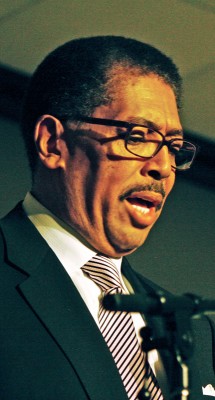
Earl Stafford, chairman and CEO of the Stafford Foundation, was the keynote speaker at Wednesday’s dinner in honor of Martin Luther King Jr. Photo by:Ramsey Neville
Ranked by the Princeton Review as the fourth most diverse college campus in the United States, George Mason University works to maintain a level of diversity and multicultural knowledge on campus and abroad. Recent Martin Luther King Jr. celebrations marked the beginning of a month of cultural awareness and education.
African-American historian Carter G. Woodson started Black History Month in 1926, first called Negro History Week. His initial intention was to establish a period of celebration and recognition for a group not mentioned in history books. More than 80 years later, Dr. Woodson’s dream is more than alive.
“The Mason sspirit encompasses both celebrating our diversity and embracing our differences,” said Teejay Brown, program manager for the Office of Diversity Programs and Services. “Commemorating National Black History Month on campus allows our community to connect an often politicized collective identity with personal experiences, historical events and current issues.”
With over 2,000 African-American students enrolled at Mason, a month-long series of celebratory events directed at educating students, faculty and staff about the African-American culture is a Mason tradition.
“Programming facilitated by [ODPS] and our partners provides an opportunity for community building across all groups and important discussions about race and ethnicity in today’s society,” Brown said.
Black Heritage Month is Mason’s adaptation of the National Black History Month celebrations. Sponsored by the ODPS, it includes a plethora of events, workshops and seminars intended to raise awareness and celebrate the African-American culture on campus and nationwide.
Various events such as the Love Jones Open-Mic Night, Mr. and Mrs. Black GMU Scholarship Pageant and the Annual Black Tie Affair are designed to bring students together and celebrate African-American culture through fun-filled activities. Other events are directed toward educating the public and spreading knowledge and awareness through lectures, workshops and guest speakers.
While previous years’ keynote speakers included Olympic gold medalist Dominique Dawes and political author Donna Brazile, this year’s guest is none other than a member of the Mason community.
Thomas Stanley, an ethnomusicologist, cultural activist and assistant professor at the Department of Art and Visual Technology, has extensive experience in lecturing and discussing black musical expression and the roles it plays in our society. His speech is scheduled to be given at 7 p.m. Wednesday in the Johnson Center Bistro.
One of the more distinguished occasions of Mason’s Black Heritage Month is the Annual Martin Luther King Jr. Evening of Reflection, which was held on Wednesday. At this event, faculty, staff and students come together in a formal event to celebrate the legacy of King while congratulating recipients of two very prestigious awards.
The Spirit of King Award is given to one student and one faculty member of the Mason community in recognition for their work in promoting intercultural sensitivity and advocating the building of a campus that values equality and justice.
This year’s Spirit of King recipients were senior English major Blake Silver and assistant professor of communication Mark Hopson.
Aside from the sheer enjoyment of such celebrations, students and faculty may find that attending these events could be beneficial to their education and careers.
“We believe these events would work well as cocurricular or extra credit opportunities for students in topically relevant classes, or as professional development opportunities for faculty and staff,” said Charles Kellom, assistant director for ODPS, in a statement to members of the Mason community.
The spread of cultural knowledge and awareness continues to be a tradition at Mason. Whether the calendar reads Hispanic Heritage Month, Asian Pacific American Heritage Month, Black Heritage Month or any of the various cultural celebrations recognized around campus, diversity is a valued trait at Mason.






Comments